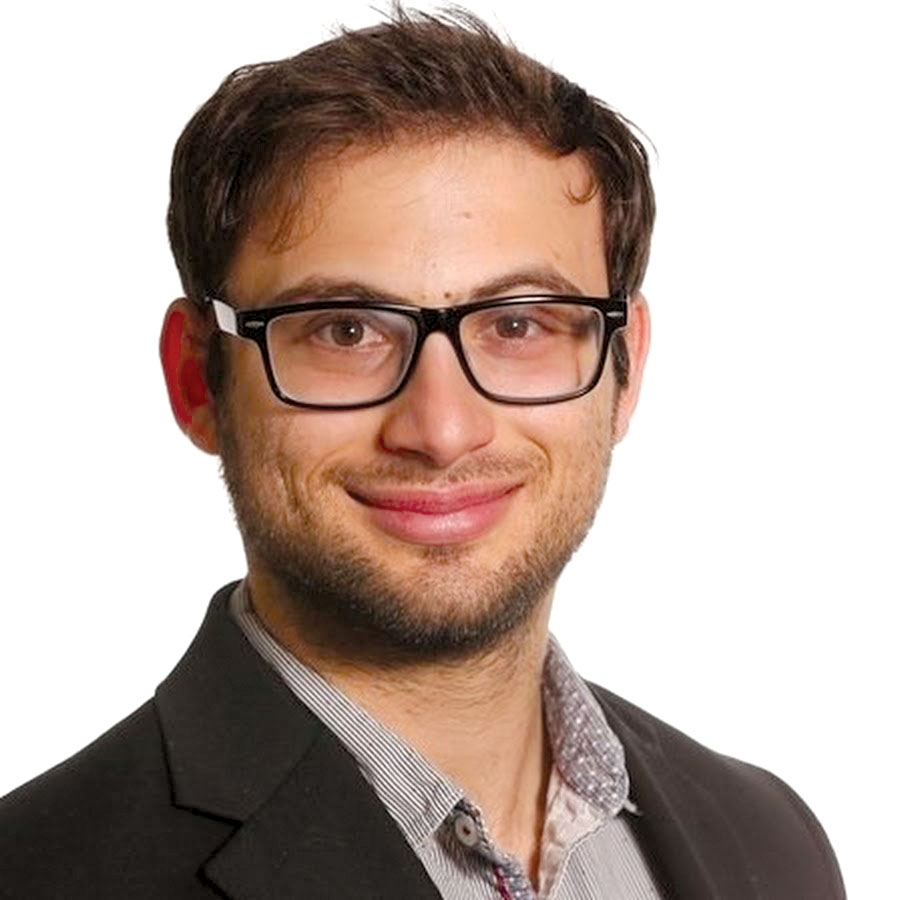“I am very much a fan of free speech,” Rabbi Daniel Levine said. And on his YouTube show, the 32-year-old San Diego native and professor at UC Irvine practices what he preaches. He interviews people from both the right and left; .his goal each time is to spread light on their views, whether you agree or disagree with the guest’s opinions.
His interviews are about happenings in the Jewish world, he said, but they are more. He almost dares the viewer to guess what his views are. The show, which has been running for about a year, is called “The Fifth Question,” a reference to the Four Questions asked at the Passover seder. “There aren’t a lot of people having nuanced conversations,” he told The Journal. “I try to talk to people I disagree with. I did an episode with someone critical of Israel, another episode with a rabbi who officiates interfaith marriages – and we had a debate about that. I had a friendly debate with a friend about whether Jews should vote Republican or Democrat in the upcoming election.” He tries to model what it means to have civil dialogue and debate, which he believes society lacks. He teaches classes on four campuses, and has seen “many students hungry for conversation, hungry to see ideas clash in a way where everyone is being respected – where there is no violence and everyone is trying to be civil for the community.”
One of the rabbi’s central themes is that more dialogue is good. When it’s mentioned that was something the late Charlie Kirk believed, he called Kirk’s murder “disgusting; one of the more horrific things to happen in my lifetime in public in America. I didn’t agree with all of his views, but I think we need more such people. The divide is between people who believe in freedom of speech, freedom of expression, and people who don’t.”
Levine believes there are extremists on both sides, and neither side agrees with the tenets of basic liberalism. “When you go far enough right he said, “there are people who don’t agree that everybody should have free speech, freedom of religion and all things fundamental to what it means to be in a liberal democracy in America.”
In the past year, Levine has encountered people from both the left and right who understand they can disagree on taxes, tariffs and foreign policy but as long as we are doing it within civil dialogue and respecting each other, that is fine. However, as soon as we start calling each other names and start threatening each other, our society is going to collapse.”
He calls himself a “principled centrist,” and explained that some think centrists are people who don’t have any views. They’re wrong, Levine insisted. As a genuine centrist, he thinks that “people both on the right and the left have good points some of the time. I don’t think either side makes good points all the time. All human institutions have flaws. Humans can never reach perfection. Only God is perfect. Anything humans create is going to be imperfect. When we try to make political parties into idols – in Judaism we know what happens to idols.”
People should look for nuance, to have their ideas challenged and invite those they disagree with for a civil dialogue. But at times, he finds himself playing devil’s advocate. “In the last couple months I have done two episodes, one where I was talking with someone much more to the left than I am while defending a right-wing viewpoint. When I was talking with someone to the right of me, I was defending a left-wing view.” Both cases, he said, proved no one side has a monopoly on truth. “Our society will be better off when we start to realize that many different groups and many different people can hold a little bit of truth.”
This, the rabbi explained, is why Judaism values dialogue so much – because it takes a lot of hubris to say any one idea holds all the truth. And to come to a wider understanding of what truth is, you have to talk to people who disagree with you.
In every interview, he wants people to “understand the art of civil debate is not over. It’s very much alive. And it is a deeply Jewish idea. Our entire Talmud is full of people disagreeing with each other in a principled way, and still remaining part of a community. That trend has continued the last 2,000 years of Jewish history. It’s fundamental to being Jewish – being able to have difficult conversations while remaining in the same community.”
Who does Rabbi Levine look for to join him on “The Fifth Question”? “People with interesting ideas,” he said, “who are willing to have an open conversation. It’s not really about what views they have. One question is, are they willing to have a civil conversation? And, do I think there is a value here?”
Rabbi Levine, teaches Jewish Studies at two schools and runs Hillel events at another one. He spends 80 percent of his time at UC Irvine, and divides the rest among between Chapman University, Cal State Fullerton and Cal State Long Beach.
To view episodes of “The Fifth Question,” go to https://www.youtube.com/@rabbidaniellevine.
Fast Takes with Rabbi Levine
Jewish Journal: What is your favorite vacation spot?
Rabbi Levine: Any place where there was an historic Jewish community.
JJ: What is the best book you ever have read?
RL: “As a Driven Leaf” by Milton Steinberg
JJ: What is your favorite family activity?
RL: We have an eight-month-old baby (our first), and we have just begun to take her hiking.
JJ: What is your next goal?
RL: I might write a book. I really love fiction.




